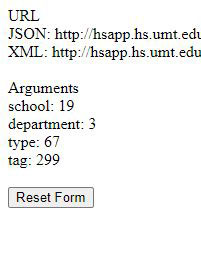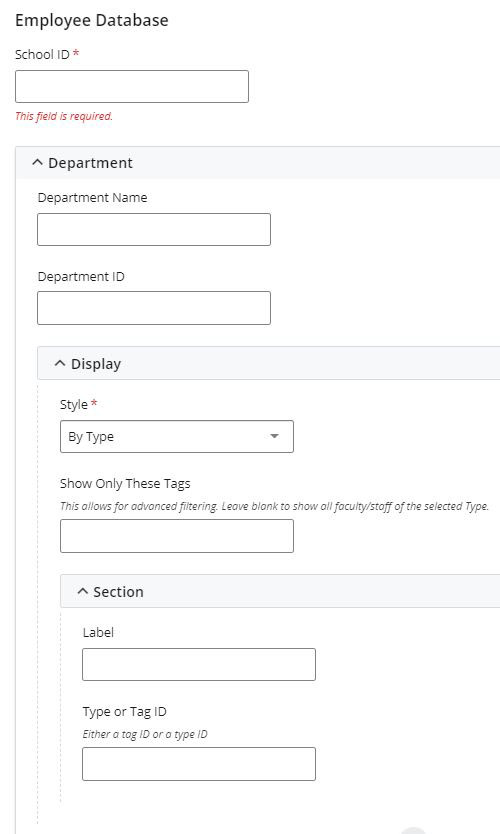Employee Database
How It Works
The employee database and its API Plugin are tools that can be used in conjunction with one another to display information about employees in campus departments. This page will walk you through using the Employee Database block on your page to display employee information.
Instructions
- Create the "Employee Database" block and add it to your site.
- Go to "Add Content" > "Blocks" > "Row Blocks" and select the "Employee Database" Block.
- Navigate to the Employee Database API Plugin and retrieve the numerical codes to enter into the Block.
- Select the "School" or "College" you are looking for.
- Select the "Department" you are looking for.
- Select the "Type" of employee you are looking for.
- Select the "Tag" associated with that employee Note: Some departments don't use tags, the query will revert to "Type" if this is the case.
- Take note of the numerical values of the School/College, Department, Type and Tag produced by the API.
- Back in Cascade, edit the "Employee Database" block you created. Enter the information generated from the API into the appropriate fields.
- Submit your changes.
- Publish your changes. NB: the Employee Database block does not display fully in Cascade, but only on the live site. Cascade will only display the numerical values retrieved from the API.
Breakdown of the API codes.
- School ID: Each school within the database is referenced by a unique ID.
- Department ID: In combination with the school ID, this identifies your department within the Faculty Database.
- ID(s): Each person in the system is associated with a personnel "type" (Professor, Adjunct, Staff, etc.), and you can filter by these IDs.
- Tag ID(s): Some departments choose to further categorize by research area or specialty with tags.


The section below is an example of what you should see after attaching the employee database block.
Irene Appelbaum
Professor, Linguistics
Contact
- Office
- Social Sciences 211
- irene.appelbaum@umontana.edu
- Office Hours
SPR 2024: M, T, W, TH 8:30 - 10:30
Online by Appt.
https://calendly.com/irene-appelbaum
Personal Summary
I am a Professor in the Linguistics Program. I began my academic career as a philosopher interested in linguistics as a higher-level science, with a focus on the foundations of speech perception research. For the past several years, my research has focused on the Ktunaxa language - a language isolate spoken by a handful of people in Montana, Idaho, and British Columbia in Canada. This project has two central goals: contributing to the documentation of Ktunaxa by interlinearizing narratives Franz Boas collected and published as Kutenai Tales (1918); and analyzing these texts for what they can tell us about the relationship between grammar and discourse, both in Ktunaxa and in other languages. I am particularly interested in how our assumptions about the respective domains of grammar and discourse guide, and sometimes misguide, research on language.
Education
• PhD, with Honors, University of Chicago, Philosophy, 1995.
• MA, University of Chicago, Linguistics, 1993.
• MA, University of Chicago, Philosophy, 1989.
• AB, cum laude, Princeton University, Philosophy, 1984.
Courses Taught
Spring 2024 Courses
• LING 270 Introduction to Linguistics
• LING 4/574 Historical Linguistics
Other Linguistics courses taught
• LING 465 History and Structure of English for Teachers
• LING 4/573 Language and Culture
• LING 4/589 Morphology
• LING 494 Seminar: Topics in Discourse
• LING 570 Seminar: Cognitive Linguistics
• LING 570 Seminar: Deixis
• LING 570 Seminar: Typology
• LING 494 Seminar: Referential Hierarchies
• LING 494 Seminar: Approaches to Sociolinguistic Variation
Courses taught in other departments
• PHIL 471 Philosophy of Language
• PHIL 479 Pragmatics
• PHIL 495 Philosophy of Linguistics
• PHIL 501 Emergence and Language
• MCLG 295 Linguistics for Language Majors
• GRK 101 Elementary Greek I
• GRK 102 Elementary Greek II
Research Interests
• Ktunaxa Language and Linguistics
• Language Documentation
• Grammatical Relations
• Language Typology
• Grammaticalization
• Discourse Analysis
• Foundations of Speech Perception
• Ancient Greek Grammar
Selected Publications
Appelbaum, I. (2021). The Importance of Being Not-Obviative, Papers of the Algonquian Conference 50, ed. by Monica Macaulay and Margaret Noodin. East Lansing: Michigan State University Press.
Appelbaum, Irene. (2019). A Discourse Function of the Passive in Kutenai. Proceedings of the Workshop on Structure and Constituency in the Languages of the Americas 22, ed. by Anne Bertrand and Heather Burge. Vancouver: University of British Columbia Working Papers in Linguistics (UBCWPL). [Some passives in Kutenai have a reference-tracking discourse function and their existence implies that the semantic analysis of passive clauses in Kutenai more generally depends on discourse context.]
Appelbaum, I. (2019) Double Obviatives and Direction-Marking in Kutenai, Proceedings of the Thirtieth Western Conference on Linguistics (WECOL) 23, ed, by Trevor Driscoll. Fresno: Department of Linguistics, California State University, Fresno.
Appelbaum, I. (2019) Review of Casey O'Callaghan, Beyond Vision - Philosophical Essays. Oxford: Oxford University Press, 2017. 203 pp. in The Philosophical Review, Volume 128, Issue 3.
Appelbaum, I. (2014). Grammaticalization & Explanation. In Grammaticalization Theory & Data (2014), S. Hancil & E. König (eds.), pp. 41-52. Amsterdam and Philadelphia: John Benjamins Publishing Company. [While grammaticalization is not itself a causal mechanism, the concept is not explanatorily empty; instead, it picks out a higher-level, functional class.]
Appelbaum, I. (2012). Result Clauses in Ancient Greek In Selected papers of the 10th International Conference on Greek Linguistics (2012), Z. Gavriilidou, A. Efthymiou, E. Thomadaki & P. Kambakis-Vougiouklis (eds.), pp. 114-121. Komotini, Greece: Democritus University of Thrace. [The distinction between possible and actual results can't be used to distinguish natural and actual result clauses because it doesn't distinguish them: they both presuppose possible results.]
Appelbaum, I. (2004). Two Conceptions of the Emergence of Phonemic Structure. Foundations of Science 9, pp.415-435. [There are two distinct and largely orthogonal conceptions of emergence implicit in Lindblom’s account of the emergence of phonemic structure, which I call 'causal' and 'analytic' emergence.]
Appelbaum, I. (2004). Physical Segments and Functional Gestures. In Proceedings of the 2003 Texas Linguistics Society Conference (2004), A. Agwuele, W. Warren, & S. Park (eds.), pp. 1-8. Cascadilla Proceedings Project.
Appelbaum, I. (2000). Merging Information vs. Speech Recognition. Behavioral & Brain Sciences (2000) 23, 3, pp. 325-6. Commentary on D. Norris, J. McQueen, & A. Cutler, Merging Information in Speech Recognition: Feedback is Never Necessary. Behavioral & Brain Sciences (2000) 23, 3, pp. 299-370.
Appelbaum, I. (1999). The Dogma of Isomorphism: A Case Study from Speech Perception. Philosophy of Science 66, 3 (Supplement), pp. 250-259. [A central turning point the history of speech perception research, widely thought to mark a break with what I call 'the alphabetic conception of speech', instead marks its entrenchment.]
Appelbaum, I. (1998). Fodor, Modularity, and Speech Perception. Philosophical Psychology 11, 3, pp. 317-330. [Fodor's attempt to resolve the conflict between the assumption that speech perception is modular and the evidence for top-down processing fails because it undermines his own conception of modularity and it cannot account for the contextually varying topic-down influences that characterize speech perception.]
Appelbaum, I. (1998). The Use of Modularity in Cognitive Science. In A Companion to Cognitive Science (1998), W. Bechtel & G. Graham (eds.), pp. 625-635. Oxford and Cambridge, MA: Basil Blackwell.
Appelbaum, I. (1998). Analytic Isomorphism and Speech Perception. Behavioral & Brain Sciences (1998) 21, p. 6. Commentary on L. Pessoa, E. Thompson and A. Noë, Finding Out About Filling In: A Guide to Perceptual Completion for Visual Science and the Philosophy of Perception. Behavioral & Brain Sciences (1998) 21, 6, pp. 723-802.
Appelbaum, I. (1996). Aspect in Fox. Contemporary Linguistics 2, pp. 23-46. Chicago: University of Chicago.
Affiliations
`

